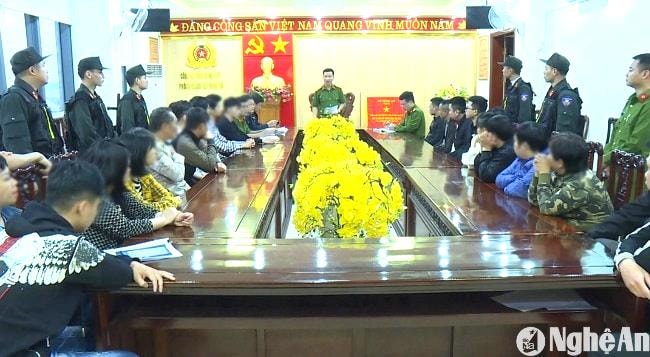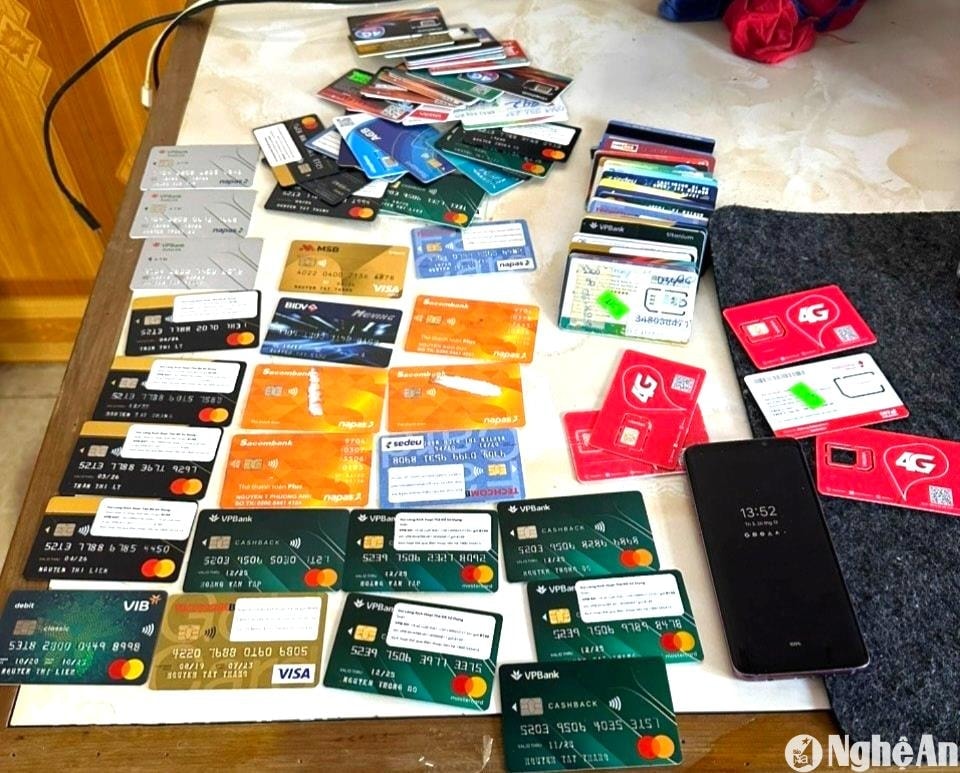Strengthening prevention and combating crimes using artificial intelligence
Recently, activities of using artificial intelligence (AI) to defraud and appropriate property have become more complicated, causing public confusion. Criminals often use Deepfake AI technology to create audio, image and video products that imitate real-life acquaintances of victims with very high accuracy, causing many people to fall into the trap.
Sophisticated tricks
In Nghe An, the situation of criminals using high technology to commit fraud and property appropriation is becoming more complicated, with an increasing number of cases using sophisticated and cunning methods.
In 2024 alone, the Provincial Police discovered and arrested 24 cases and 115 subjects.
A typical recent example is that the Criminal Police Department (Nghe An Police) discovered a group of Vietnamese people colluding with subjects in Cambodia to purchase bank accounts to provide to fraud gangs to appropriate assets via cyberspace.

During the investigation and verification process, the Police Agency determined that this was a criminal gang with a completely new nature and method, organized, with specific division of tasks among members, led by Vu Trung Kien (born 1994), residing in Vu Thu district, Thai Binh province; Pham Hoang Hiep (born 1992), residing in Thai Hoa town, Nghe An province; Vu Hoang Nha (born 1984) and Hoang Xuan Truong (born 1988), both residing in Yen Khanh district, Ninh Binh province.
Accordingly, to serve the fraudulent activities of appropriating assets on the internet through the trick of impersonating Facebook accounts, social networks of relatives to trick people into transferring money, defrauding financial investments..., the subjects have created a system of "henchmen" in many provinces and cities across the country to buy bank accounts.
These subjects approach many different components, occupations, and ages in society, especially the elderly, low-income workers, people with little knowledge of the law, or students... to hire them to open bank accounts to receive wages at prices ranging from 500,000 - 4,000,000 VND/account.
After successfully opening a bank account, the account owner must hand over account information, phone SIM, email, record a video of his face and follow other requests of the subjects.

Personal information and videos of account owners will be used by the subjects to hack biometric bank accounts and then transfer them to subjects in Cambodia to receive fraudulent money and launder money from criminal activities.
The purchase of bank accounts to provide to subjects across the border was assigned by Kien, Hiep, Nha, and Truong to subjects Dao Van Khanh (born 2001), residing in Yen Chau district, Son La province; Bui Thi Thuong (born 1984), residing in Ha Dong district, Hanoi city and Ta Thi Lan Anh (born 1973), residing in Hai Ba Trung district, Hanoi city as level 1 "agents" to directly carry out. In order to purchase many bank accounts, the level 1 "agents" continued to create and assign a number of subordinate "agents" to carry out.
The police agency clarified that in a short period of time, the criminals rented and bought more than 500 accounts at many different banks (including personal and business accounts) for the purpose of fraud and money laundering.
After a period of collecting sufficient documents and evidence, on December 15, Nghe An Provincial Police presided over and coordinated with relevant units to successfully crack down on the case, arresting 41 subjects involved in the acts of "Illegal collection, storage, exchange, purchase, sale, and publicization of information about bank accounts; Fraudulent appropriation of property, and money laundering" occurring in Nghe An province and many provinces and cities across the country.

Initially, the Criminal Police Department of the Provincial Police clarified that the above-mentioned group had laundered money and defrauded more than 50 billion VND from many victims across the country. In Nghe An, there was a victim who had been defrauded by the subjects and had the amount of money appropriated up to 700 million VND.
Previously, also in 2024, Nghe An Provincial Police discovered and arrested 1 case, 7 subjects used Deepfake technology and many supporting software to open many payment accounts for the purpose of appropriating voucher money (a voucher or purchase code with a value equivalent to cash) from banks.
Notably, on the eve of the Party Congresses at all levels for the 2025-2030 term, the situation of using AI technology to edit and edit images and videos to defame and tarnish the honor and dignity of personnel preparing for the Party Congress has become complicated, potentially containing many factors that negatively affect the work of ensuring absolute security for this important political event.
Raise vigilance and proactively prevent
According to the Ministry of Public Security, some common tricks of using AI technology to commit crimes today include:
Using Deepfake technology - a technique that combines deep learning and machine learning algorithms to create fake images and videos so realistic that it is difficult to distinguish between real and fake; changing voices, cutting and pasting sounds, changing faces to impersonate state agency officials to threaten victims related to cases under investigation, asking victims to transfer money to accounts designated by the subjects or requesting to provide OTP codes to authenticate money transfers and then appropriating them - this is the most common method currently occurring in Vietnam.

In addition, subjects use Deepfake to crop images, fake voices, create "sensitive" images and videos of victims, thereby manipulating their psychology, threatening victims with the aim of defaming their honor, insulting their dignity and blackmailing them; spreading false information and fake news to influence public opinion and cause social instability.
Using AI technology in unmanned aerial vehicles (UAVs) to transport drugs, weapons, and contraband to predetermined locations; human trafficking, illegal border crossing; pre-programming unmanned aerial vehicles to attack and terrorize crowded areas or designated areas...
Using AI technology to create malicious codes and software for the purpose of network attacks, taking control of server systems, stealing login passwords; developing sophisticated viruses and malware to infiltrate and destroy network systems...
Using AI technology to commit crimes in the cryptocurrency market, specifically, they take advantage of the situation of the sudden increase in the prices of some virtual currencies to create applications on mobile platforms and websites of virtual currency and foreign exchange exchanges impersonating financial institutions to commit fraud by calling and asking participants to transfer money before starting a transaction in the form of registration fees, participation fees or deposits.
Once enough money has been raised, the subjects will sophisticatedly adjust the transaction results or crash the system to appropriate all of the investors' money.
To proactively prevent and combat crimes using artificial intelligence technology, on December 2, 2024, Nghe An Provincial Police issued Official Dispatch No. 2224/CAT-PV01 to heads of provincial departments, branches, sectors, and mass organizations and districts, cities, and towns requesting coordination in the prevention and combat of crimes using AI technology.
In particular, it is recommended that cadres, civil servants, public employees, and workers actively protect personal data and not provide personal information (phone number, ID card, address, personal photos, family information, etc.) to anyone if the background and identity of the information recipient are unknown.
Do not join groups, accept friend requests, click on links on social networks of unknown origin; Do not post, like, or share unverified information to prevent and minimize the risk of criminals using AI technology.
If there are signs of the subject using the above tricks, do not accept or delay receiving calls or messages from the subject and promptly contact the nearest police agency for timely support and assistance.

Nghe An Provincial Police also requested that secretaries and chairmen of People's Committees of districts, cities and towns pay attention to directing People's Committees of communes, wards and towns to increase information about the methods and tricks of this type of crime to the people in many forms.
In particular, focus on individual propaganda to those who are vulnerable to fraud such as the elderly, those with limited information technology skills; women, gullible people; financial investors but with limited knowledge in this field, unemployed people who want to find income through the Internet...
For the people, the police agency recommends not providing bank account information or bank OTP codes to anyone; not installing applications from unverified links or instructions; not participating in securities transactions or electronic trading floors that are not protected by the State.
“Each person needs to regularly update information and equip themselves and those around them with knowledge. When discovering or suspecting that they have been scammed, they need to immediately report to the nearest police station for guidance and resolution,” Nghe An Police recommended.


